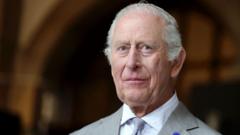King Charles III's recent arrival in Canada marks his first visit since ascending to the throne and is laden with historical significance as he prepares to deliver the Speech from the Throne. This address, also known as the throne speech, is traditionally made by the governor general. However, newly elected Prime Minister Mark Carney has invited the King himself to inaugurate the 45th session of Canada’s parliament, a rare honor last seen in October 1977 when Queen Elizabeth II delivered the address.
The throne speech is instrumental as it outlines the government's agenda and cannot commence public business within the House of Commons or Senate until the address is delivered. King Charles's invitation also highlights a deeper context: his presence served as a response to the recent strains in Canadian-US relations, particularly amid tensions over tariffs imposed by former President Donald Trump.
Upon his arrival at Ottawa’s Macdonald-Cartier International Airport, King Charles and Queen Camilla were warmly received by Governor General Mary Simon and Prime Minister Carney, alongside Indigenous leaders, signaling an important recognition of diverse Canadian identity. The royal couple commenced their visit with engagements that emphasized cultural diversity, including a tree-planting ceremony at Rideau Hall.
As the King prepares to deliver the throne speech, he will participate in traditions such as inspecting a military guard and receiving a 21-gun salute. The throne speech triumphantly opens parliament and embodies the King's symbolic gestures toward Canadian sovereignty—a sentiment echoed by political leaders and Indigenous representatives during his visit.
King Charles has previously expressed admiration for Canada, calling it a "proud, resilient and compassionate country," subtly aligning himself with Canadian values, especially during a time of political uncertainty. His visit is not just a ceremonial duty but serves to emphasize the enduring relationship between Canada and the Crown, essential for fostering unity and shared democratic values in a rapidly changing world.



















